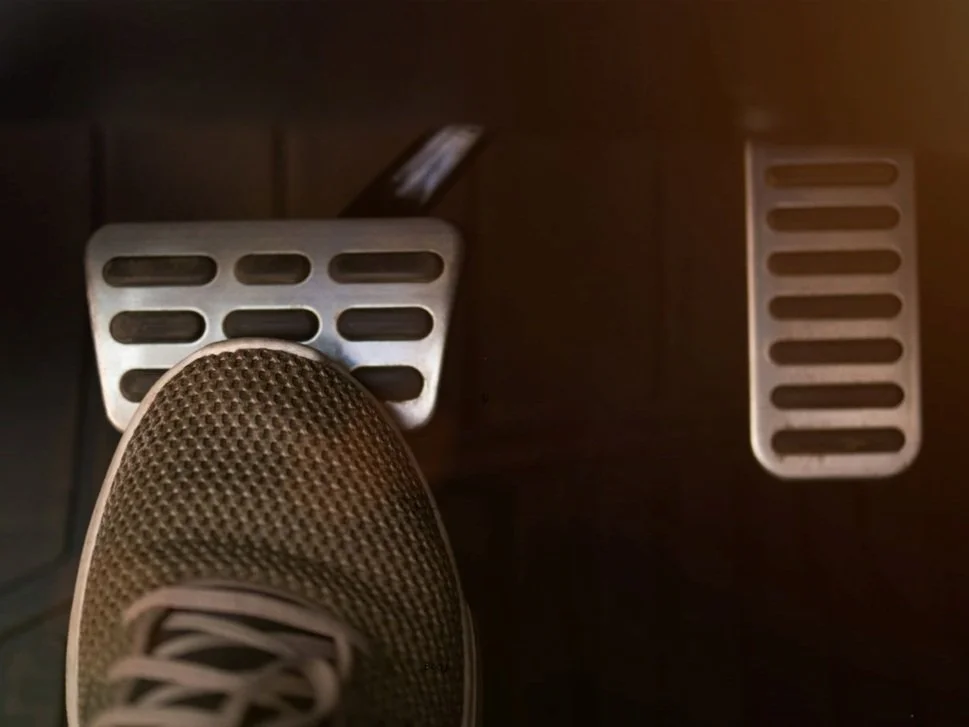Finding Your Sexual Gas & Brakes
Why does it seem that some of us are pretty much always ready-to-go when it comes to being sexual,
and others of us seem to need the stars to align just right to put us in the mood? Does this mean that
some of us are more sexy and more sexual? And others are less so? Nope. According to sex educator
Emily Nagoski, it’s normal to be ready to go, and it’s also normal to need the stars aligned.
Turns out sexual response involves the brain as much as the body. It’s a setup that connects your brain
with your nervous system. Like a car, this system has a gas pedal and brakes.
Our sexual gas pedals are constantly receiving sex-related stimuli – things we see, hear, smell, taste, or
imagine -- and telling our genitals, “Let’s go! Turn on!” The gas pedal is always at work, even though we
usually aren’t aware of it. We don’t notice it, but that’s what leads us to feeling turned on, or pursuing
sexual pleasure.
We all also have sexual brakes. Like the gas pedal, the brakes are scanning for potential threats, and
sending the signal to our genitals to “Stop! Turn off!” We actually have two brakes – like a foot brake
and hand brake. The foot brake is responsible for preventing unwanted consequences of being sexual,
like STI’s, unwanted pregnancy, and being walked in on by our kids. The hand brake is like a chronic “no
thank you,” that can range from subtle to very strong. The strength of the hand brake depends on what
it is connected to. A history of sexual trauma* can trigger a very strong hand brake response. Day to day
stress can result in a low-level hand brake response.
We all have a gas pedal and brakes.
And we all have them in different proportions. Some of us have a lead foot on the gas pedal, and others have
strong brakes. This accounts for our differences when it comes to what it takes to get us in the mood.
According to Nagoski, all ways of being sexually, all combinations of gas and brakes, are normal.
So the process of becoming aroused involves both pushing the gas pedal and letting up on the brakes.
When a person struggles with sexual desire, arousal, or orgasm, the problem might be too little
stimulation to the gas, or too much stimulation to the brakes.
To maximize your sexual wellbeing, Nagoski suggests noticing what helps activate your gas pedal, and
what causes you to hit the brakes.
Think of a few sexual experiences you’ve had, whether solo or with a partner. Mark the factors below
that activated your ga pedal, and which hit the brakes. Add your own as well. Invite your partner to
mark their answers as well.
Things that push the gas for you:
o Feeling wanted by your partner
o Feeling connected to your partner
o Thinking about sex
o Reading erotica or looking at porn or some other explicitly sexual media
o Being touched in just the “right” way
o Being in a setting you associate with sex (vacation, hotel, place you previously had a positive
sexual experience
Things that hit your brakes:
o Stress
o Body image
o Shame
o Performance anxiety
o Fear of being interrupted or caught
o A history of sexual trauma*
o Relationship characteristics (especially trust)
o Parenting (being constantly touched, so associating touch with parenting mode rather than sexy
mode)
o Feeling expected or obliged to have sex
Now talk about this together.
How can the two of you begin to introduce more elements into your sex life that push your accelerators, and
help you let off the brakes? Nagoski says that many people find it easier to begin by talking about what
presses the gas pedal. Ask your partner, “When we’ve had great sex, what was going on in our lives, in our
relationship, and in that encounter?” It may help to be very specific, rather than general.
When you move to what hits the brakes, rather than launching into a list of turn-offs, Nagoski suggests
asking the question, “What are things that get in the way of great sex?”
She also suggests ending every conversation about sex by expressing gratitude to your partner that you
have the kind of relationship where it’s okay to talk about sex. Let your partner know you’re glad they’re
willing to pay attention to what makes this shared part of your relationship good.
*Sexual trauma can be difficult to overcome by ourselves. If past sexual trauma is causing you distress, or interfering with your ability to enjoy being sexual, consider processing this with a therapist.
Nagoski, Emily. Come As You Are: The Surprising New Science That Will Transform Your Sex Life. Simon
and Schuster, 2021.
Nagoski, Emily. The Come As You Are Workbook: A Practical Guide to the Science of Sex. Simon and
Schuster, 2019.

